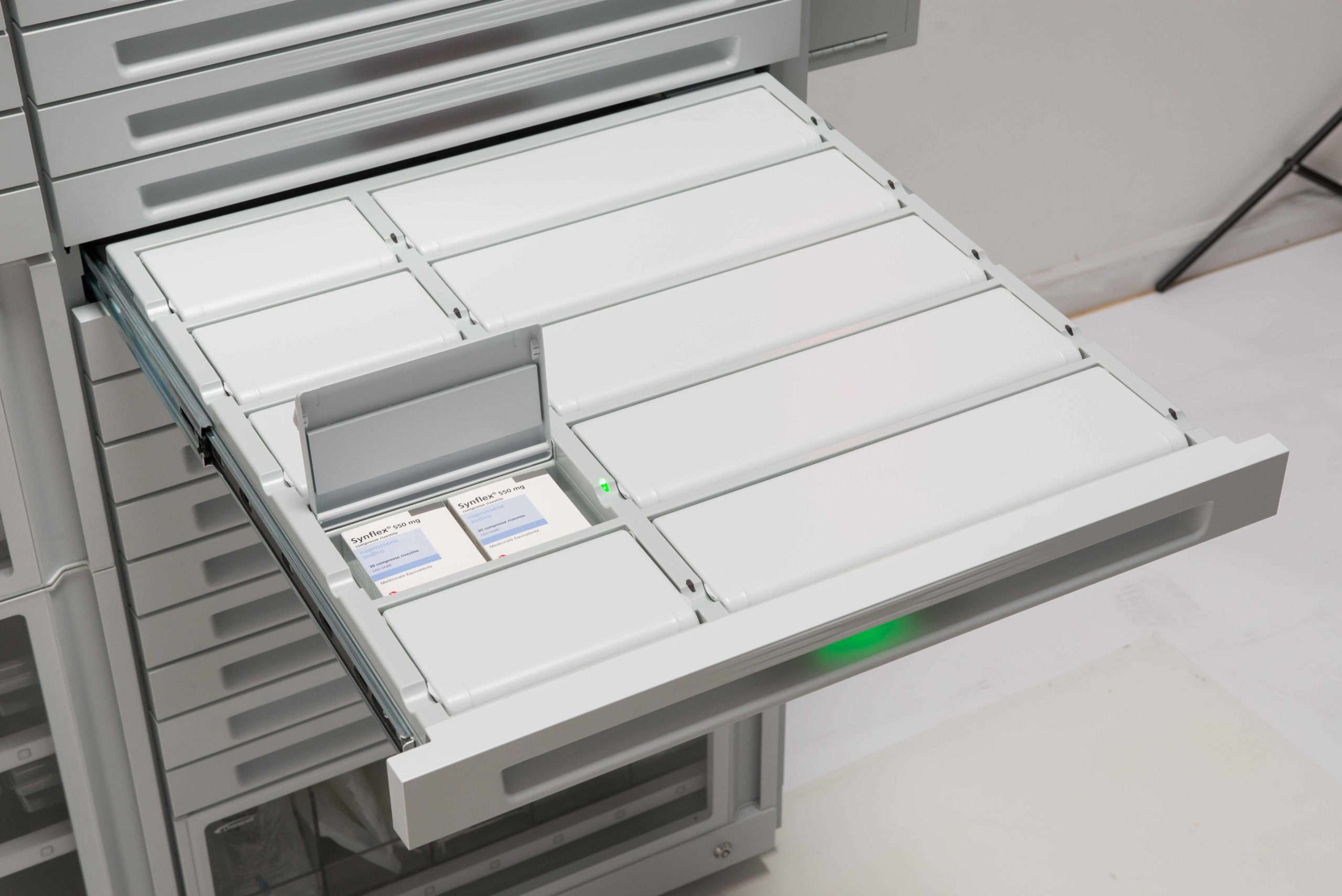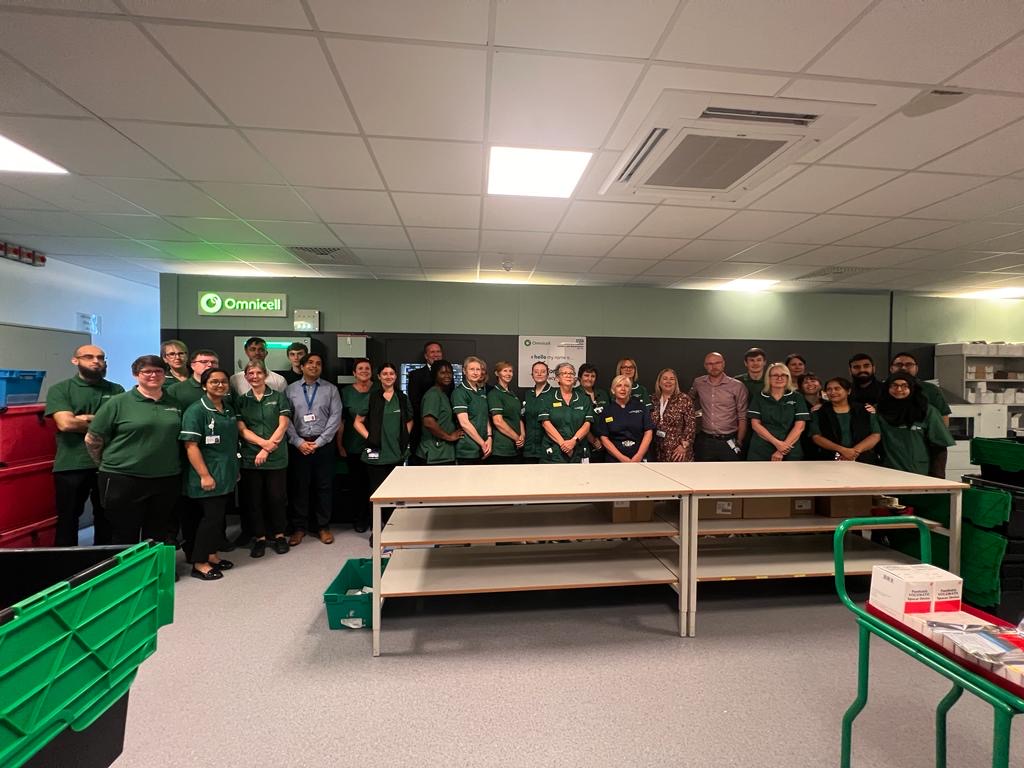Optimising medication management: lessons from an NHS Trust

Hardeep Bagga, Director of Pharmacy at University Hospitals Coventry and Warwickshire NHS Trust, discusses how best to manage the implementation of new technology following the success of digitalising pharmacy services.
University Hospitals Coventry and Warwickshire (UHCW) NHS Trust is one of the largest acute teaching Trusts in the UK, comprising University Hospital in Coventry and the Hospital of St Cross in Rugby, and working in partnership with Warwick University Medical School and Coventry University. It has more than 10,000 staff and delivers services across the West Midlands region. This includes hosting region-wide services such as the Coventry and Warwickshire Pathology Network and Bowel Cancer Screening programme.
In 2018, the Trust launched an ambitious target to begin a journey of digitising their medicines management systems, starting with a Trust-wide implementation of Automated Dispensing Systems to drive safe and legislative compliance with storage. At the time, medication storage was time and operationally intensive on pharmacy and nursing teams. The Trust was on a journey to establish Electronic Patient Records (EPR), and it was agreed that a solution was needed to bring together both challenges; improving medicines storage and security to fully leverage the power of a hospital EPR system.
Initially, we had to present a business case within the Trust, which included recognising the external and internal scrutiny required to ensure we had robust medicines storage; assessment of security, nurse-led audit work, as well as acknowledging the impact of medicines handling on Time to Care. A number of enthusiasts supportive of the programme were recruited from ICT, Nursing, Pharmacy and Estates teams.
Following a competitive tender process, we made the decision to partner with Omnicell UK, who provide advanced automation, data intelligence and professional services, in order to transform operational efficiency and improve patient experience in hospitals.
Omnicell initially worked with us on our first stage installation, which included introducing more than 70 Automated Dispensing Cabinets (ADCs) on wards, in theatres and clinics. Such was the scale of the operation that at the time, it was one of the largest and fastest European rollouts.
Unbeknown to us at the time of committing to the project, but we were inadvertently helping to prepare ourselves for the biggest healthcare challenge the NHS has ever witnessed – the Covid-19 pandemic. Since implementation, the Trust has improved management of medicines during shortages, taken waste out of operational delivery of the supply of medicines, informed teams around medicines safety during temperature deviations, and is now progressing towards closed-loop medicines administration.
Project and installation highlights include the following:
- All wards and departments have automated dispensing systems for medication storage (72 units in total), including two in pharmacy for controlled drugs and after-hours support.
- Medication Safety Officers (MSO) used a live view to track high demand, essential treatment medicines throughout Covid and beyond.
- Temperature monitoring gives an overview of real time temperature of all stock areas to support informed decision-making during temperature deviations.
- Digital ordering by automated dispensing systems has reduced nurse time handling medicines by using pharmacy team time saved from ordering medicines redeployed to fill cabinets instead of nurses.
- Increasing breadth of stock holding as top up occurs thrice or more weekly, rather than just weekly, across the Trust.
Such was the success of the project, that over the entire pandemic, the wards never ran out of stock of essential Covid treatments by utilising this technology.
Essential elements in the change management process
An effective and well thought out change management process was crucial in gaining buy-in from internal stakeholders and in particular, the nursing team who would be day-to-day users and large beneficiaries of the new technology.

Valuable best practice lessons can be taken from trusts such as ours, to help support the successful adoption of technologies across the healthcare sector. First and foremost, this includes the need to have a solid change management plan in place to drive employee engagement – employees have to be part of the planning as much as the execution.
Adaptations to technology also tend to go more smoothly when applied from the ‘bottom up’. This can be done by assigning and engaging ‘change champions’ or representatives within different departments. The key overriding factor remains: be the lead on the timeline and rules of the technology, but let your employees decide how to run the show.
A good way to start, as we did at UHCW, was to encourage internal stakeholders to make a list of their wishes and goals from the project at the outset. This was supported by a clear communication and adaptation strategy which emphasised the value and usage of digitalising and automating pharmacy services, and the impact this would have on internal teams, as well as our patients. This helped to ensure the implementation process went smoothly and served to remind us all of the end goal when at times, the project ate into our time or we hit a bump in the road.
It’s important to work closely with your technology partners to ensure effective communication. Omnicell was key to understanding our workflow, mapping this out to ensure systems benefited the way we work, as well as providing ongoing education and training. As partners on the project, the post ‘go live’ support, which included floor walking and handholding for ‘live day’ and the week afterwards, was imperative.
The project is by no means complete and currently we are working towards a key milestone which will be to link the ADCs and our robotic dispensing system to Oracle-Cerner. This will mean that our patient record system will provide a live/real-time view of what’s stocked in cabinets, as well as streamlining workflow and retrieving medications. All with enhanced security and removing process waste to support closed-loop administration.
More recently…
Further enhancing the Trust’s technology adoption, we recently installed two large dispensing robots in pharmacy – Tom and Jerry – with a joint capacity to hold more than 50,000 packs of medication. Importantly, they have allowed for the automation of nearly two million medication transactions which were previously ‘hand-picked’. The time saved allowed a skill mix change within the department, releasing time for Medicines Management Assistants (MMAs). As a result, MMAs are now working directly on wards, and utilising automated cabinets to improve patients’ medication journeys. Dedicated medicines returns units have helped drive the better use of medication and recycling of stock medication at a ward level. The impact has been staggering, saving large amounts in waste prevention.
In addition, all ward stock medication top-ups are now fully automated; the ward ADC sends a message to the robots at 6am and all ward boxes are picked and packed by the robots before the staff come into work. This process previously required manual picking and an accuracy check by another senior colleague, but is now fully automated.
The Pharmacy team last year celebrated winning the CEO Team Award at the Trust’s Outstanding Service and Care Awards (OSCAs), which is positive recognition of its digital transformation.
Find out more about the new MES initiative: Omnicell.co.uk or email: Sales-aa@Omnicell.com
